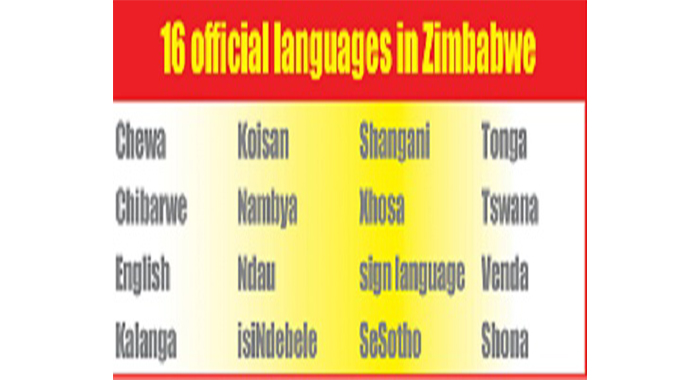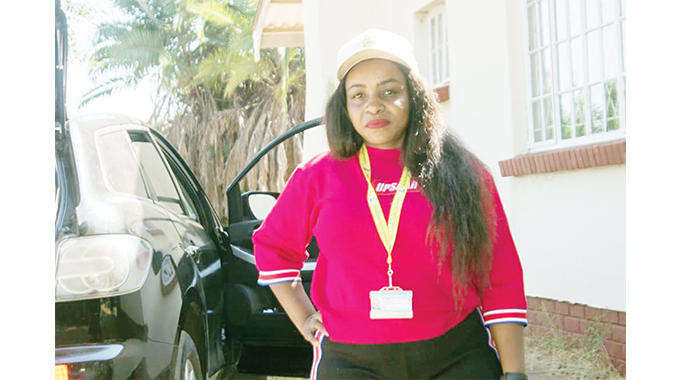Self-rule has seen 16 official languages recognised

Thandeka Moyo-Ndlovu and Mkhululi Ncube, Chronicle Reporters
ONE of the greatest achievements that came with self-rule in Zimbabwe has been the recognition of diverse languages which have enabled every citizen to take part in the development of the country and benefit fully from national programmes.
Unlike during the colonial era when only three languages — IsiNdebele, Shona and English were prioritised, Zimbabwe has fostered the use of 16 languages including sign language to cater for citizens with disabilities.
Previously dubbed the minority languages, some of the languages have even made it to public Grade Seven examinations and of late some of these can be studied up to degree level at tertiary institutions.
Zimbabwe before independence was divided into the Southern region where isiNdebele was the major language and the northern region where Shona was the main language.
The colonial arrangement shut out the different communities found in Zimbabwe especially from the southern region whose mother language is not IsiNdebele.
Since the adoption of the 2013 Constitution, Zimbabwe has 16 official languages, namely Chewa, Chibarwe, English, Kalanga, Koisan, Nambya, Ndau, iSiNdebele, Shangani, Xhosa, sign language, SeSotho, Tonga, Tswana, Venda and Shona.
The supreme law of the land has also been translated to some of these official languages to ensure communities have access to the Constitution. With the global pandemic, Covid-19, wreaking havoc worldwide, the Government through the Ministry of Health and Child Care has generated posters with health information in different languages.
Every little action counts with Covid-19 so communities have to understand it fully in their mother-tongue to avoid deaths.
In an interview, renowned culturalist and linguist Reverend Paul Damasane said inclusivity was among the great post-independence milestones in empowering the people of Zimbabwe.

Reverend Paul Damasane
“The first thing we consider about the inclusivity of languages is within the constitutional framework and then the cultural development framework. If a people’s culture is respected and central to their day to life it has a way of promoting their own livelihoods,” said Rev Damasane.
“Language carries culture hence it is critical for the development of any community or even country. When you use one’s mother language you are enabling them to link their own world view to their surroundings. You also enable them to engage effectively with things that make them better,” he said.
Rev Damasane said language is also a tool and vehicle of development which enables people to freely express themselves and take an active role in the betterment of Zimbabwe.
“The fact that the Government has taken the view of devolution and decentralisation is a great milestone. When one recognises your language, they accept your way of thinking and make themselves a part of you. This is where you remember a community or a people and make them into a unit. We don’t have to speak the same language because unity is not uniformity it is more cohesion — the convergence of people into one ideal,” he added.
For linguistic expert Dr Omphile Marupi, inclusivity has also enabled the Sotho speaking communities to pursue academic aspirations now that their language is even part of Grade Seven Examinations.
“In 2019 under the UNICEF Capacity Building Programme, 41 teachers graduated with degrees in SeSotho from the Great Zimbabwe University and I was the lecturer and that on its own shows growth of the language even at academic institutions. So ECDS can now access SeSotho lessons and from 2019 Grade Seven exam candidates write SeSotho” said Dr Marupi.
“We have Hillside Teachers College which recently enrolled student teachers to train in Sesotho and Lupane State University even now has programmes that caters for other languages besides isiNdebele.”
Dr Marupi said even in the media the inclusion of other languages has contributed to growth.
He also said from 2001, ZBC had news session in SeSotho both on TV and radio and the recent community radio Station Khulumani FM has a lot in store for Zimbabweans who speak SeSotho, Venda, Kalanga, Tonga, Xhosa and isiNdebele.
“From an academic perspective, we are now using our Mother language and we feel that we are part of the community. For each human being, according to great scholars, we understand best whatever is consumed in our Mother Language,” he said.
Dr Marupi said: “Socially it has helped resuscitate our language and culture as a people who are part of the country, as people who have rights to freedom. Now we can socialise freely without fear. Economically we are seeing a lot of translations like the NDS 1 recently printed in SeSotho as well as the New Curriculum,” he said.

Dr Omphile Marupi
“We also have got room to co-exist with any other language and even religion-wise people are getting out of the box and expressing themselves freely without fear. We are surely moving from the colonial mentality of thinking Ndebele is the only major language for Matabeleland,” he said.
The Deputy Minister of Information and Communication Technologies, Postal and Courier Services Dingumuzi Phuti says the inclusion has enabled Kalanga people like him to communicate freely even at public meetings.
“The old and colonial era really affected us as it was very unfair because some languages got extinct, especially the language spoken by the ‘Bushmen’. These people were ridiculed and looked down upon. Eventually they decided assimilation to other Languages like Kalanga and Ndebele was a way of upgrading one’s self,” said Dep Min Phuti.
“We saw people slowly moving from their cultures into those of others whose languages were prioritised. They developed inferiority complexes. The language policy was developed in 1921 and divided the country into two making isiNdebele the major and only language of the Southern people and ChiShona for the northern people.”
Cde Phuti said making all 16 languages official in Zimbabwe was a milestone development.
To further cement the speaking of all languages in the country, the Government has opened the national airwaves with commitment to licence 10 community radio stations in areas where the national languages are spoken.
Some of the areas have been struggling to receive local signals for radio and television.
So far, six out of 10 community radio stations licences have been granted and the radio stations are expected to start broadcasting soon.
The Broadcasting Authority of Zimbabwe has so far awarded community radio stations licences to The Mbembesi Development Trust, Ntepe-Manama Community Radio Trust and Nyangani Community Radio Trust, Shashe Community Radio Broadcasting Association which covers Beitbridge and Shashe, Chiredzi Rural Communities Development Initiative Trust trading as Avuxeni FM which covers Chikombedzi, Chiredzi, Rutenga, Mahenye and Malipati and Lyeja-Nyayi Development Trust that covers Hwange and Victoria Falls.
BAZ is processing the remaining licenses which cover Plumtree and Binga, among others. — @thamamoe.









Comments